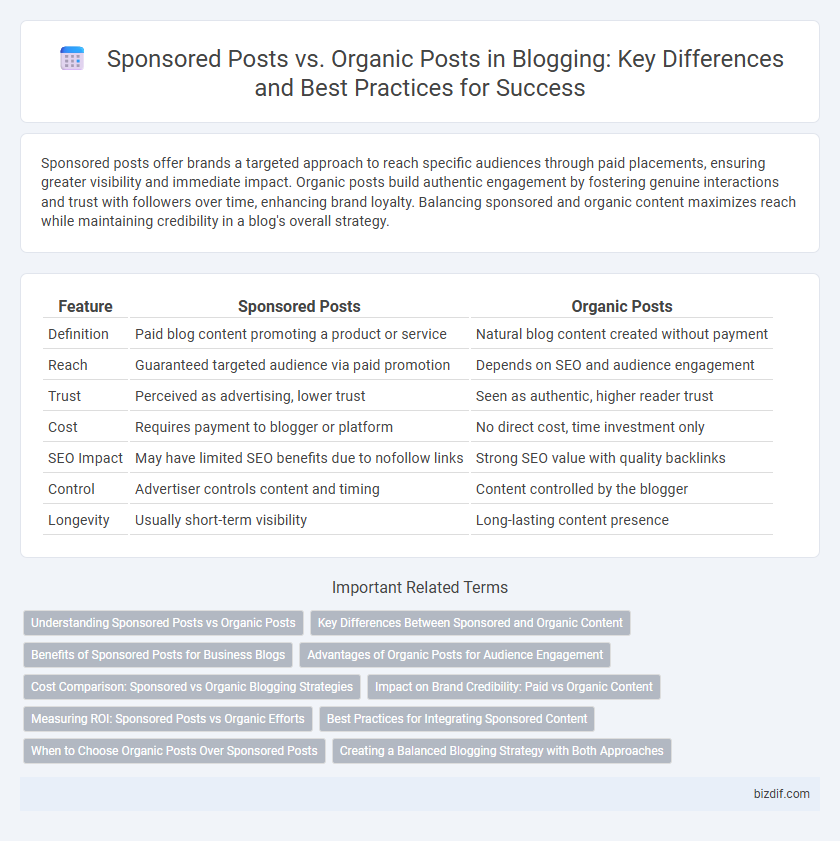Sponsored posts offer brands a targeted approach to reach specific audiences through paid placements, ensuring greater visibility and immediate impact. Organic posts build authentic engagement by fostering genuine interactions and trust with followers over time, enhancing brand loyalty. Balancing sponsored and organic content maximizes reach while maintaining credibility in a blog's overall strategy.
Table of Comparison
| Feature | Sponsored Posts | Organic Posts |
|---|---|---|
| Definition | Paid blog content promoting a product or service | Natural blog content created without payment |
| Reach | Guaranteed targeted audience via paid promotion | Depends on SEO and audience engagement |
| Trust | Perceived as advertising, lower trust | Seen as authentic, higher reader trust |
| Cost | Requires payment to blogger or platform | No direct cost, time investment only |
| SEO Impact | May have limited SEO benefits due to nofollow links | Strong SEO value with quality backlinks |
| Control | Advertiser controls content and timing | Content controlled by the blogger |
| Longevity | Usually short-term visibility | Long-lasting content presence |
Understanding Sponsored Posts vs Organic Posts
Sponsored posts are paid content created to promote a product or service, often marked as advertisements to comply with disclosure regulations. Organic posts grow naturally through genuine audience engagement without direct payment, relying on valuable content and community interaction. Understanding the differences between sponsored and organic posts helps bloggers strategically balance monetization and authentic audience growth.
Key Differences Between Sponsored and Organic Content
Sponsored posts involve paid promotion where brands directly finance content to reach targeted audiences, ensuring visibility and specific messaging control. Organic posts rely on natural engagement without payment, building audience trust through authentic interaction and gradual growth. Key differences include content control, audience reach, and perceived authenticity, with sponsored content offering immediate exposure and organic posts fostering long-term credibility.
Benefits of Sponsored Posts for Business Blogs
Sponsored posts significantly boost business blog visibility by targeting specific demographics, increasing engagement rates, and driving higher traffic compared to organic posts. They enable precise brand messaging and faster achievement of marketing goals through paid promotion on popular platforms and influencer channels. This strategic investment results in measurable ROI, enhanced brand authority, and expanded audience reach.
Advantages of Organic Posts for Audience Engagement
Organic posts foster authentic interactions by building genuine trust and credibility with the audience, which enhances long-term engagement. They encourage community participation through natural conversations and user-generated content, leading to deeper connections. Furthermore, organic posts benefit from higher algorithmic prioritization on social platforms, increasing visibility and interaction without additional advertising costs.
Cost Comparison: Sponsored vs Organic Blogging Strategies
Sponsored posts typically require a financial investment ranging from $100 to several thousand dollars per post, depending on the blog's audience size and niche, offering immediate visibility. Organic posts, while cost-effective, involve time and effort to grow blog traffic naturally through SEO, content quality, and social media engagement without direct payments. Evaluating the return on investment, sponsored posts provide faster results but higher costs, whereas organic blogging demands consistent work with long-term, sustainable audience growth.
Impact on Brand Credibility: Paid vs Organic Content
Sponsored posts can boost brand visibility quickly but may raise skepticism among audiences due to perceived commercial bias, potentially impacting brand credibility. Organic posts foster trust and authenticity by delivering genuine, user-driven content that strengthens long-term relationships with followers. Balancing paid and organic strategies is essential to maintain credibility while achieving marketing goals in blogging.
Measuring ROI: Sponsored Posts vs Organic Efforts
Measuring ROI for sponsored posts involves tracking direct metrics such as click-through rates, conversions, and immediate revenue generated from paid campaigns. In contrast, organic posts' ROI hinges on long-term engagement, brand loyalty, and cumulative traffic growth, which can be assessed through metrics like organic reach, user interactions, and search engine rankings. Combining data from both sponsored and organic efforts provides a comprehensive view of marketing effectiveness and overall blog performance.
Best Practices for Integrating Sponsored Content
Integrating sponsored content effectively requires clear disclosure to maintain reader trust and comply with advertising regulations such as the FTC guidelines. Sponsored posts should align closely with the blog's niche and audience interests to enhance authenticity and engagement, ensuring that promotional material feels natural rather than intrusive. Employing a balanced content strategy that combines organic posts with sponsored content preserves content diversity and blog credibility, driving sustained reader loyalty and SEO benefits.
When to Choose Organic Posts Over Sponsored Posts
Choose organic posts over sponsored posts when aiming to build authentic audience engagement and long-term trust without immediate advertising costs. Organic content performs best in nurturing a loyal community through consistent, value-driven updates that foster genuine interactions. Opt for organic posts during brand-building phases where natural growth and credibility matter more than rapid reach or conversions.
Creating a Balanced Blogging Strategy with Both Approaches
In blogging, integrating sponsored posts with organic content enhances audience trust while driving revenue. Sponsored posts offer targeted exposure and monetization opportunities, whereas organic posts build authentic engagement and long-term relationships. A balanced strategy leverages analytics to optimize content mix, ensuring both brand alignment and consistent traffic growth.
Sponsored Posts vs Organic Posts Infographic

 bizdif.com
bizdif.com